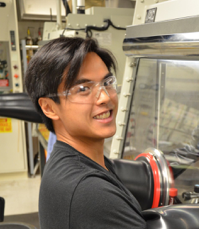The Department of Chemistry & Physics would like to highlight our newest professor, Dr. Nathan Lau! Dr. Lau recently moved to the east coast from California and is teaching chemistry at Emmanuel College. He will be teaching CHEM 1102 – Principles of Chemistry II lab and lecture and CHEM 2115 – Inorganic Chemistry during this upcoming spring semester. Fun facts about Dr. Lau are that he enjoys spending time with his family, trying new restaurants in the city (specifically in the North End), and likes to exercise to de-stress!
Dr. Lau’s favorite science class to take as an undergrad was inorganic chemistry. In an interview Dr. Lau explained, “Prior to inorganic chemistry, I did not really understand how chemistry, especially organic chemistry, fit together. At first seemed like a random collection of ideas that did not have a unifying thread. Once I learned about the applications of molecular orbitals in my inorganic classes, all of chemistry suddenly made sense. I could now see the logical thread that united my chosen field.”
When asked what inspired him to go into teaching, Dr. Lau replied, “I have fortunately known what I have wanted for my career since high school. In high school, I saw how impactful my excellent teachers were to me and wondered if I could also inspire students. During this time, I went on several summer mission trips to the inner city. I found that I really enjoyed tutoring the children, and crucially a pastor that I met mentioned how important good teachers were for students in urban America. Thus, these high school experiences put me on the challenging but exhilarating path of a professional educator.”
Dr. Lau enjoys teaching labs the most because he feels likes the labs give him a good opportunity to get to know his students better. He likes to interact with and mentor his students through hands on experiments and demonstrations in the laboratory.
As an inorganic chemist, Dr. Lau is most interested in understanding how metal complexes can transform small molecules. His research background is in designing metal complexes and small molecules to try to mimic protein-like behavior. Many important proteins in our environment involve metal complexes, which is surprising because the general public often imagines that metals and biology are incompatible. In graduate school, Dr. Lau worked on tripodal (three armed) metal complexes that could engage in both strong and weak interactions. Most inorganic chemists only focus on the strong (covalent) interactions, but the Borovik Lab utilized weaker (noncovalent) interactions such as hydrogen bonding to stabilize many highly reactive species. As a postdoc in the Pluth Lab, Dr. Lau focused these studies of weaker interactions to the elements sulfur and selenium. He was able to successfully use hydrogen bonding to bind negatively charged, anionic derivatives of these elements in simple receptors, mimicking how this might be accomplished in biology.
At Emmanuel, Dr. Lau plans to study how metal complexes react with sulfur, combining his work from his PhD and postdoctoral studies. Sulfur is a very complicated element to work with, being very reactive as well as generally being foul smelling. However, it is an essential biological nutrient, and it is known to react in complex ways with metal compounds. Dr. Lau hopes to use metal compounds that can form hydrogen bonds to try to stabilize some of these complicated products, in order to understand how biological systems process sulfur-based species.
When asked what helped him choose to come to Emmanuel, Dr. Lau answered, “I have been very fortunate to have primarily worked in collaborative, positive environments. Both UC Irvine (PhD) and the University of Oregon (Postdoc) had very supportive, collaborative chemistry departments. When I first came to Emmanuel to interview, I saw that our department here has the same environment. After I started working here, I have found this to indeed be the case; all of my colleagues have been extra supportive and helpful to me, an inexperienced first year professor. They are proactive in helping me as well, which is really special given how busy we all are! Additionally, I have extended family in the Boston area. I am very close to my family and have so far really enjoyed the opportunity to spend extra time with them.”
Dr. Lau is an amazing addition to our department and we all look forward to learning more inorganic chemistry!
~Written by Amanda Castellucio ’22, Edited by Dr. Aren Gerdon


Recent Comments